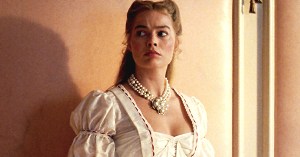Past Lives Star Greta Lee on Fate, Complex Characters, and Connections Across Time
Lee reveals how she was mistaken for another famous "Greta" and why the film didn't feel like a "no-brainer" despite how much she connected with the script.
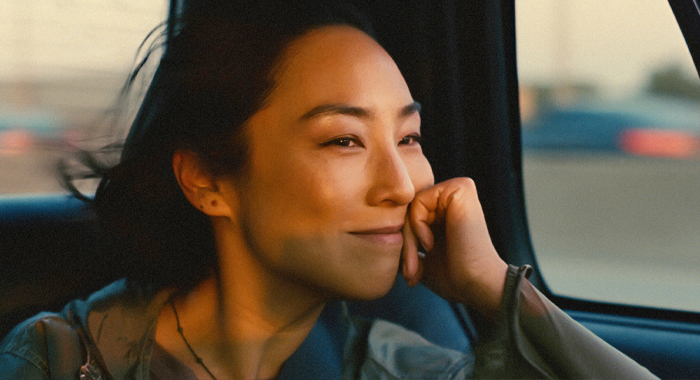
(Photo by ©A24)
Comedic performers taking dramatic turns have fascinated and intrigued audiences since the earliest days of motion pictures, when the likes of Charlie Chaplin earnestly turned to break the fourth wall and warned viewers of the dangers of fascism in The Great Dictator. An actor making us cry after they’ve made us laugh is the stuff careers are made of, and if there’s any justice left in cinema this year, it should make Greta Lee a household name. The Korean American actress has been making waves and stealing scenes for over 15 years on screen, whether it be the hilarious BFF in Natasha Lyonne’s Russian Doll or her latest efforts as Lyla, the irreverent hologram in Spider-Man: Across the Spider-Verse.
Currently, Lee headlines writer-director Celine Song’s debut feature Past Lives. It’s fitting that, for her first time at the top of the call sheet, she portrays a character that not only hits close to home, it lives there, within unpublished chapters of her life that she now unveils to the world. That’s where Lee told us she found the character, and it has resulted in the best reviews of her career. Past Lives is currently Certified Fresh at 97% on the Tomatometer, with Trace Sauveur of the Austin Chronicle calling Lee and her co-star Teo Yoo “electric together, conveying an excess of feelings both unspoken and not fully understood through their graceful exchange of looks and dialogue.”
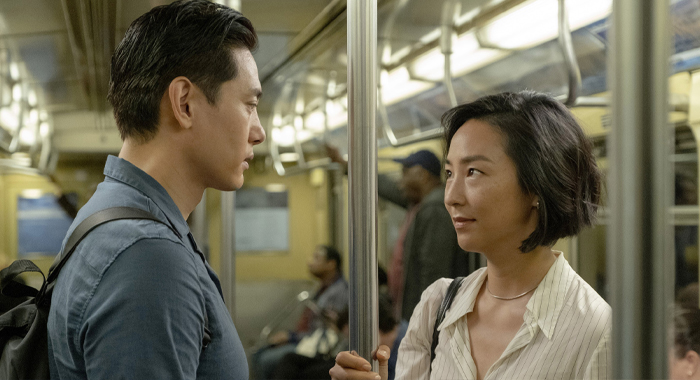
(Photo by Jon Pack/©A24)
Lee plays Nora, a semi-biographical version of the director, in a dramatic retelling of an encounter with a childhood friend decades after they separated in Korea and she is happily married in New York. Lee is masterful as a woman stuck between the life she has built with her husband Arthur (John Magaro) and the ghost of an unexplored romance haunting her present. Meeting up with her childhood love Hae Sung (Yoo) years after she immigrated to the United States, the remembrance of their time together is so far removed from Nora’s life in America that it feels akin to reincarnation. A powerfully poignant tale of longing, romance, and regret, Past Lives begs the audience to find the joy and beauty in the tiny increments of love we transfer between one another, sometimes for a moment, a season, or a lifetime.
The film details a three-person love story, but make no mistake; this is not a love triangle. It’s the story of loving two people at the same time, where there are no villains except for the villainous cruelty of time and circumstance. Lee’s performance is one that already has Oscar pundits (including ours) whispering, but when we sat down with The Morning Show actress recently, trophies were far from our minds. Instead, she confessed how terrifying it was to tell a story so close to her heart, talked about the Korean/Buddhist philosophy that is central to the story, and explained how nearly losing the role turned into a lovely moment of meta-serendipity.
Jacqueline Coley for Rotten Tomatoes: So tell us about getting the role, because I heard it was a journey to get here. You had the role, then maybe it was gonna go away? I don’t know what I would do if I had read this script and lost this dream role.
Greta Lee: Right?! At that time, I didn’t even know who the enemy was, like who I could take it from. It felt infuriating. There was nothing that could be done about it. (laughs) I mean, on some level, it reflects some of the movie’s core ideas in a hilarious way. I read the script and had a very intense connection with it. I had no idea who Celine was. I wasn’t expecting to read anything like this. I didn’t know anything about it other than that it was a drama, a romantic drama, and a love story. And then I was completely floored by how much my own expectations were subverted by what I read. And it is one of those things; it did feel immediately clear, like, “Oh wow, whoever gets to do this is going to be one very, very lucky lady.” And it didn’t feel like a no-brainer shoo-in by any means.
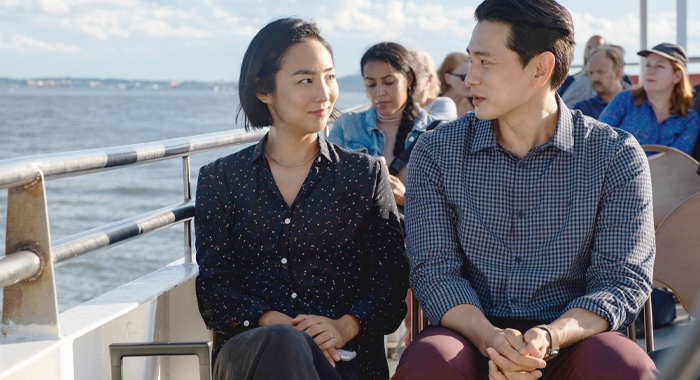
(Photo by Jon Pack/©A24)
I’m Korean American. I speak Korean, but it’s not something that was on my vision board if I’m going to do a movie that is almost exclusively in Korean. And so I was approaching it from this… It was both a deep connection but also a little bit of removal and feeling like, “Oh, this job doesn’t feel like it’s automatically mine.” And I did what actors do. I read for it, and I did have a fake-out where I got a call that appeared to be something celebratory. A “you got it” moment.
And then I found out that that message was actually for Greta Gerwig for something completely different. Her assistant had called me and had the wrong number. But at that moment, you can only laugh when something like that happens even then, because it just felt so clear: “Wow, this is just not going to go my way.”
And then, a year later, completely out of the blue, I got a call that this time actually was for me, asking if I would sit down over Zoom and meet with Celine. And that was wild. And from there, it happened so unexpectedly. There was no time to prepare anything; I just had to run with what I imagined I would do if the job could ever be mine. I’m still wrapping my mind around it, honestly.
RT: Was that something you had to “get your head around” this idea of it being so within your identity but previously unexplored on screen? It must be equally thrilling and terrifying.
Lee: Oh, yeah. It was incredibly exposing. I mean, I grew up in Los Angeles. I have immigrant parents, but my immigrant story is different from Celine’s and Nora’s, who are Korean Canadian and immigrated much later. But that’s to say, I grew up and my first language was Korean, but over the course of my lifetime, that is something that I had grown accustomed to setting aside and putting away. So living in that part of myself, not too dissimilar from Nora, was really complicated for me. It was excruciating, and it was painful because it just forced me on a daily basis in a no-chill kind of way to confront this idea of everything I had left behind and certain choices that I’d made in my life to be where I am today, to be an actor who’s able to be in a movie like this. It was all very activating. And now that the movie has been done for some time, I’m in my own process of, just like Nora, saying goodbye, because the reality is I’m just not immersed in that much of my original language. I traffic in English, and I’m thoroughly American. So yeah, it was a joy, and it was such an honor and a gift, and also, it really hurt a lot.
RT: The concept of inyeon, I’m sure, is a part of that? Can you explain that bit, because it is central to the story but difficult to explain? Also, how did you approach that part of it? It plays differently in Korean culture, correct?
Lee Yes, well, inyeon is just really about human connectedness. It’s something that, maybe even for me personally, this concept felt foreign to me and philosophical, maybe academic. But the reality is, for Koreans, it’s a very casual concept used every day and can even be used to describe a relationship with an object. People are just saying that they have inyeon all the time. And now that I’ve done the movie, I can see inyeon everywhere. It’s very exhausting, actually.
In the context of the movie, it’s just about your choices. And yes, that includes the people in our lives. And it is just talking about them; it’s observing the human experience in the context of the fact that we only get to live once, and we have to choose. Whether it’s between two people, whether it’s where you live or what job you take. And this question that I think so many of us have, “Am I currently on my best track in life,” or “How do I reconcile the things that I’m losing because I’m choosing something else?” Inyeon really is just about that. It’s just this idea that you can have a connection with someone that may be something, a connection that suspends time and space, and certain connections you have with a family member or spouse are deeper connections. Still, you have an unlimited amount of other kinds of predestined, fated ties.
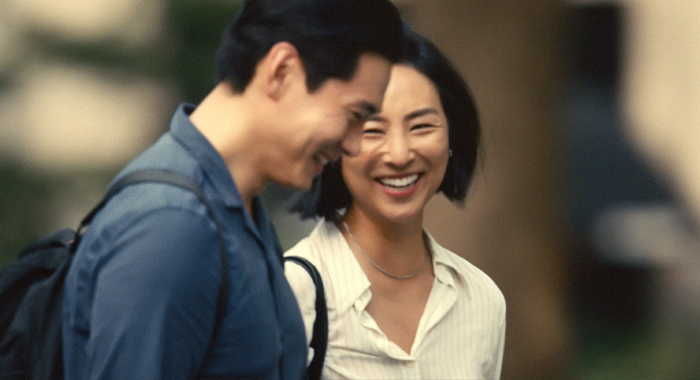
(Photo by ©A24)
RT: Going into the film, which is set up as a bit of an unrequited love story, you figure there has to be a villain in the tale. It is so interesting that Nora is caught between these two incredible men, Arthur and Hae Sung, yet there are no villains. How did you three and Celine approach playing that subtlety?
Lee: Yeah, I mean, that’s exactly right. There are no villains, and there are no bad guys, which, arguably, I think makes it more complicated. I would often joke like, “Oh my gosh, I wish there were some fisticuffs that you guys could get into a brawl. Then that would make it my job as Nora so much easier.”
But I think from the jump, Celine had always expressed this vision of making this movie about good people doing their very best to make good decisions, which I think is ultimately much more fascinating to play and leaves so much more space to look at things like existential ideas of destiny and fate and our human capacity for love that are incredibly universal as opposed to tending to these other things. It was all in the script, and through the supreme guidance of Celine. And also these guys, these two men who were so committed to the idea of playing these good modern men.
Even when making this movie, so much of it became about staying focused on the movie we had all agreed to make, and that proved to be difficult, to try to actively ignore expectations of what a love story usually requires. Are we servicing those conventions? Are we entertaining enough? Are we demonstrating enough and really actively and collectively as a team? Putting that aside was the name of the game for us, and it was hard, very hard. I don’t want to blow up Teo, but I remember at one point he, in a very professional way, just brought up the question of, should we, for safety, maybe film like a kiss or just something that maybe… Do we need that? Is this too restrained? And Celine was like, “Absolutely not.” But she was right. You have to know that the movie lives and dies on this idea of these mature people.
RT: One of the most incredible parts of the film is how much it surprises you, even in the expected emotional moments. In a film like this, you expect to cry. But when you finally get there, you have to laugh too, because of what makes you cry. So again, it’s just completely unexpected.
Lee: But that’s life. That’s actually truer to life. The actual experience of living, including falling in love or receiving love, or negotiating love in any way, is brutally painful and hilarious. It’s embarrassing and uncomfortable and the most beautiful, exquisite experience anyone could have. So we’re happy to see that people can experience that themselves as a moviegoer.

(Photo by Jon Pack/©A24)
RT: The film is structured so well. How it is assembled grounds the story, but playing that way is daunting for an actor. Everything you play in Act I will hit so much harder by the time you get to Act III, and you have to play it with that knowledge but not tip your hand. How did you approach that, especially when another actor might take the baton or hand it off in the performance?
Lee: Yeah. I mean, it is that thing where there’s like, it does feel like athletic, some acrobatics, to constantly — I don’t want to say repressed, because that’s not really what fully explains what’s going on — but to trust, to trust that it’s enough, to show the reality of a complex situation and, as you say, is also this mundane. But to understand, we were really betting on this emotional arc of betting on a certain kind of payoff that involves inviting the audience to take this ride with us in a very specific way. That was the challenge. Reading the script and understanding, “Okay, there is no emoting, there’s no menstruation of any sort until the very end.” And even that was a very specific kind of release.
So yeah, it’s a testament to the support we had, to Celine, who was so steadfast in the mission we were on, and the guys too, and encouraging me too, because I came from doing a lot of comedy, and all of the silence and all of the… The silence can sometimes feel very exposing and challenging in that you’re wondering, “Is this enough? Can I continue to trust that the audience will be able to connect and understand?” I liked thinking about it in terms of music. When you see musicals and when someone breaks out into song, and this idea that that can only happen when there are no other words to convey what’s happening. In reverse, it’s sort of how I felt about the silence, those moments when no language can articulate what’s going on, there aren’t words, and trusting that that’s something that all of us can understand. So it is trusting… A lot of the movie was about trusting that as a universal experience.
Lee: Yes. I mean, John and his brilliant performance… Really, the whole movie lives and dies with it. Whether or not you believe that there is a man who loves her so completely and in such a mature and beautiful way, he can understand the full complexity of the situation and still say, “I love you.” That was paramount to Nora’s ability to experience the gift of being able to say goodbye to this certain part of herself through her encounter with Hae Sung. Those scenes were one of the first times the crew could understand us. I mean, previous to that, the experience of making this movie felt like Teo, Celine, and I were in a silo speaking almost exclusively in Korean, with the entire crew following along with the sides that had the translation. Still, it was karaoke, which was the only way they could understand what was happening. And I remember that day, the first time we read, when we did the scene of Nora and Arthur in the bedroom, in the apartment. I remember our sound department was in tears. That was the first day I think they understood on a new level, or it just cracked something.
Past Lives is currently in theaters.
On an Apple device? Follow Rotten Tomatoes on Apple News.
Thumbnail image Courtesy of @A24





